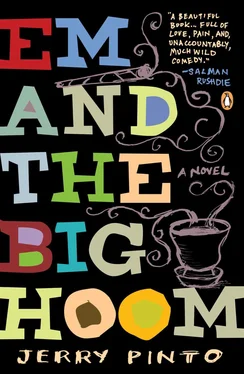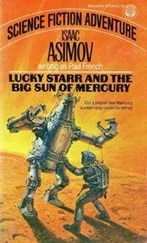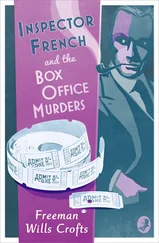Jerry Pinto - Em and the Big Hoom
Здесь есть возможность читать онлайн «Jerry Pinto - Em and the Big Hoom» весь текст электронной книги совершенно бесплатно (целиком полную версию без сокращений). В некоторых случаях можно слушать аудио, скачать через торрент в формате fb2 и присутствует краткое содержание. Год выпуска: 2014, Издательство: Penguin Books, Жанр: Современная проза, на английском языке. Описание произведения, (предисловие) а так же отзывы посетителей доступны на портале библиотеки ЛибКат.
- Название:Em and the Big Hoom
- Автор:
- Издательство:Penguin Books
- Жанр:
- Год:2014
- ISBN:нет данных
- Рейтинг книги:3 / 5. Голосов: 1
-
Избранное:Добавить в избранное
- Отзывы:
-
Ваша оценка:
- 60
- 1
- 2
- 3
- 4
- 5
Em and the Big Hoom: краткое содержание, описание и аннотация
Предлагаем к чтению аннотацию, описание, краткое содержание или предисловие (зависит от того, что написал сам автор книги «Em and the Big Hoom»). Если вы не нашли необходимую информацию о книге — напишите в комментариях, мы постараемся отыскать её.
Em and the Big Hoom — читать онлайн бесплатно полную книгу (весь текст) целиком
Ниже представлен текст книги, разбитый по страницам. Система сохранения места последней прочитанной страницы, позволяет с удобством читать онлайн бесплатно книгу «Em and the Big Hoom», без необходимости каждый раз заново искать на чём Вы остановились. Поставьте закладку, и сможете в любой момент перейти на страницу, на которой закончили чтение.
Интервал:
Закладка:
‘Why?’
‘I think he meant that a man had to look fresh at all times. And if the rain got you, you could change.’
It seemed like odd advice but perhaps a drink-sodden doctor felt that any other advice coming from him might seem odd.
We seemed to have reached the church. It was time to turn back. But The Big Hoom kept on walking, lost in thought.
‘Did you visit him every week?’
He stopped and looked at me.
‘If anyone ever does you a favour, you cannot forget it. You must always credit them, especially in public, especially to those they love and those who love them. You must pay your debts, even those that you can never fully repay. Anything less makes you less.’
But he did not say anything more. He was in the process of taking out a cigarette, a rare pleasure that he allowed himself infrequently, although he always carried a packet around. It was understood that no one was allowed to speak to him when he was smoking, no one except Em.
• • •
Anything less makes you less. Was that how it was for him as a husband? She had loved him, and he would never forget it; he would be with her and love her in return, always, even if it wasn’t enough.
It is only now that I think of this — of him. Em filled our lives, there was no space in our minds for The Big Hoom. He was our constant, he was perfect, he just was. We were never really curious about his past, or even his present outside our flat.
When did he first sense that his buttercup wasn’t whole? I don’t know. How did he deal with it when he first discovered that she needed to open up her veins, throw herself in front of a bus? I don’t know. How did he deal with it when she turned over in bed and asked him whether showing the Marines her Maidenform underwear would save her children? I don’t know.
Perhaps the truth is not that Em extinguished all curiosity about The Big Hoom, but that I, at least, couldn’t ask because I was afraid. I thought he might no longer be able to do what he did if he realized he was doing it.
How did he deal with it all? Now, I can only guess: One day I told him about the boys of the neighbourhood, about their mocking.
He said, ‘That’s because they don’t understand.’
‘They should understand,’ I said. I didn’t want to cry, but I was crying.
‘If your mother had diabetes, what would they say?’
‘I don’t know.’
‘This is like diabetes. She’s not well. That’s all.’
Was that what he told himself? That she was not well? That she might get better? I don’t know.
6. ‘I am no I’
Em, Susan and I were talking about the buying of books. Susan and I assumed that Imelda wanted to buy books on those endless bookshop evenings with Augustine.
‘No,’ she said. ‘I didn’t.’
‘You just told yourself that because you didn’t have the money,’ Susan said.
‘Did I? Much you know. I didn’t want to buy books. And I don’t, not now. I don’t know if I ever did. I love books. I love reading. The pills took that away from me. They made it difficult.’
‘To concentrate?’
‘Yes. But that’s only sometimes. Most often, they made it difficult to sympathize. You have to care a little and I couldn’t because caring would mean letting go.’
‘Letting what go?’
She looked at Susan, then at me, with none of her usual defiance. Instead, there was something like bewilderment in her eyes. ‘I wish I knew. Sometimes I would see myself as a book with bad binding. You know, like one more reader, one more face-down on the bed and I was going to spill everything, lose control.’
She shrugged.
‘I know. What control do mad people have? I don’t know myself. I only know there is some control. Some things you can choose not to say. Some things you can choose not to do. It’s such a mess, that’s why it’s madness. Because even when you say things which are not in your control, you’re saying them because not saying them will mean having to say other things. So you say, “I’ll let this one out of its cage and that should make the other cage stronger.”’
She looked at us again.
‘Never mind, I’m happy you don’t understand. Maybe it does skip a generation.’
I shivered but put the thought away.
‘But I liked bookshops,’ she said.
And somehow the boy from Moira figured that one out. His own parents had been as close to illiterate as made no difference. His father, as a cook in a palace somewhere out in the Deccan Plateau, could read Urdu. His mother could sign her name on the letters she dictated to him. The only books he had ever possessed as a child were the battered hand-me-down textbooks of the English-medium school to which he had been sent.
Perhaps that was why he loved books so passionately.
‘There’s a book sale on,’ Augustine would announce in passing to Imelda, as he whirled by her desk in ASL.
I remember Em saying, ‘He always looked like he was in a hurry. Not that he ran, but he seemed to move very fast, like Mercury. So when he slowed down and took his time to chat to you, the effect was devastating.’
I tried to imagine The Big Hoom like that. I couldn’t. Had she slowed him down? Had we?
There weren’t many bookshops in the days when Imelda and Augustine were young. And in the bookshops, there weren’t many buyers. Just lovers, long-distance lovers.
‘I didn’t go to bookshops to buy. That’s a little bourgeois. I went because they were civilized places. It made me happy there were people who sat down and wrote and wrote and wrote and there were other people who devoted their lives to making those words into books. It was lovely. Like standing in the middle of civilization.’
I rolled my eyes. Susan glared at me. Em didn’t seem to care. She was picking idly at the edge of her dress and a part of me wondered if this was only her reverie or an early warning sign of a bout of depression.
‘I went to bookshops to smell that lovely aroma of a new book. I would pick up a copy and run the pages across the ball of my thumb and let the fresh-baked smell flow up my nose. Then I would lick my thumb. It didn’t taste of anything, but it was like finding a chocolate wrapper inside a book and remembering the taste of the chocolate.’
‘You put chocolate wrappers into books?’
‘Indeed we did. Not just any old chocolate. Special chocolate. Chocolate from abroad. Chocolate your best friend gave you.’
‘As a bookmark?’
‘No, not as a bookmark. As remembrance. That should you never get chocolate again, you would know you had once eaten this bar.’
It seemed odd.
She read my mind. (‘Mad people are telepathic, clairvoyant and everything that should frighten you. Be afraid of me,’ she had once joked.)
‘Yes, I was a little odd even back then — I must have been, no? In fact, I think we were both odd. We did not go to buy. We went to bookstores because they were high-ceilinged rooms with slow-turning fans. We went for the evening light and the shelves full of lovely things. We didn’t have quite as many things back then. Things like these,’ she said, pointing to the bowl of glass toffees a cousin had brought us from Prague. ‘I can’t imagine why anyone would make glass toffees when real toffees in a bowl make people so much happier. What do glass toffees mean?’
‘I think they’re supposed to be for ironic amusement,’ I said.
‘Gosh. No, I don’t think there was a shop full of ironic amusements.’
She picked up a glass toffee and twirled it between her fingers.
‘When you two are not here, I’m going to raise an eyebrow at them and look ironically amused.’
We giggled together. Em set down the toffee.
On days like this — no, at moments like this — it was quite possible to forget all the tags — mad, manic depressive, bipolar — and frolic with her through van Goghian fields of free association.
Читать дальшеИнтервал:
Закладка:
Похожие книги на «Em and the Big Hoom»
Представляем Вашему вниманию похожие книги на «Em and the Big Hoom» списком для выбора. Мы отобрали схожую по названию и смыслу литературу в надежде предоставить читателям больше вариантов отыскать новые, интересные, ещё непрочитанные произведения.
Обсуждение, отзывы о книге «Em and the Big Hoom» и просто собственные мнения читателей. Оставьте ваши комментарии, напишите, что Вы думаете о произведении, его смысле или главных героях. Укажите что конкретно понравилось, а что нет, и почему Вы так считаете.











